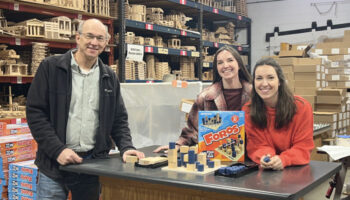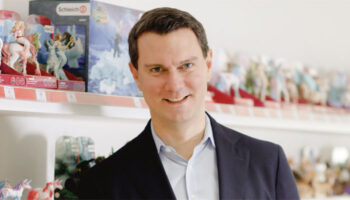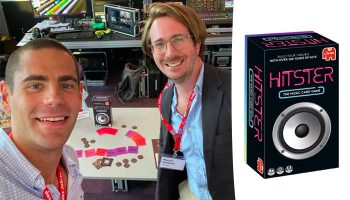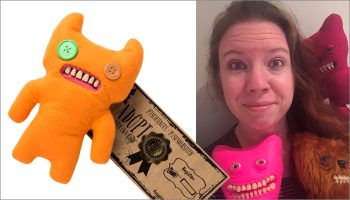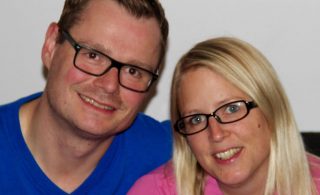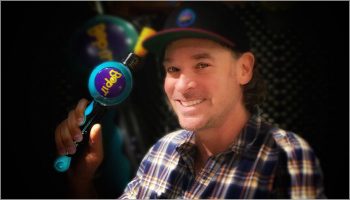Professor Puzzle founder Ben Meldrum on starting, growing – and the secret sauce that keeps them going

Thank for making time! So… Ben Meldrum – interesting surname; any idea where it’s from?
It’s Scottish. Old Meldrum is a town near Aberdeen.
Is that right?
And you know, spellcheck turns it into ‘melodrama’… I quite like that.
Ha! I don’t know when that fact will come in useful, but I also like it! And for anyone unfamiliar with Professor Puzzle, what is it you do?
There are two sides of the business. The catalogue side, where we specialise in games and puzzles, and the bespoke side… With the bespoke side, we deliver ‘made to order’ ranges to the large global retailers. Bespoke also focuses around games and puzzles, but goes much wider into different categories.
Interesting. I was surprised to learn the company is 20 years old! How did it come about?
I was in Calcutta in India, and found a man selling puzzles made out of wire and nails in the street…
And when you say puzzles, you mean the kind of things you might find in a Christmas cracker? That sort of twist-and-release thing?
Yes, exactly. I thought it was fascinating so I paid him for puzzle-making lessons, and brought the craft back to London. I started selling metal puzzles in Camden and Covent Garden markets. The business was originally called Ben’s Baffling Brainbenders. I started the business with £250.
Fantastic! And now that you’ve grown a fair bit, what are the values at Professor Puzzle?
It’s all about the people, first, second and third. Our talented and focused team is our secret sauce, so I’d say that we’re a business of 90 people first and foremost. The team’s really come together after the period of lockdowns… I believe that our product is the best simply because our team is the best.

It’s refreshing to hear somebody say that and mean it, Ben; that’s great. I’m curious, then: how has the market changed since you started?
We started the wholesale business by selling nail puzzles only… I wonder if someone could do that now. Then we moved to metal puzzles, all made in the UK. It got us to cottage-industry size, but we needed to outsource production to China to scale. Then the business really changed.
How so?
We could suddenly make whatever we wanted! We continued to specialise in metal and wooden puzzles, and I believe we became the best in the world in this area. But the market kept moving on – as it does. We wanted to develop from one-player games into the much faster moving two-or-more player games. So we did! And to really excel in puzzles, paper – rather than wood or metal – was where the future was taking us.
Paper puzzles?
Well – escape-room games and thoughtful, paper-based boxes of challenges. This market seems to be expanding as rapidly as the games area.
In 2017, you took your first steps into licensing. What was the range?
We took on the Einstein licence as it seemed a great fit with our puzzle and brainteaser area.
How did that work out for you?
At the time, we were still primarily puzzle focused. So not many licences attracted us. Einstein worked perfectly, but because very few licences could work for us, this meant we never became a company that leant heavily into licensing. If you don’t licence, there really is nowhere to hide. Your product has to speak for itself to succeed.

Interesting. What is it you look for in licenses and licensing partners?
At the moment, the truth is that we don’t. But we may well be missing a trick here.
And with your products in general, is there anything specific you wouldn’t consider?
Yes – games that encourage you to drink too much. And games that degrade or mock – they’re examples of the sort of thing we avoid.
Where do the ideas you have come from?
Our people! Our team is endlessly generating ideas. Most of our creativity comes from within the team – not from outside talent.
And how do you personally stay creative, Ben?
I suspect that I am no longer very creative. But I like to think that I was once. In my twenties, I steered a creative, ground-breaking enterprise. Now my challenge is to be a worthy CEO of a company of 90 people. The reality is that I get pulled into the creative too much and should learn to leave it with the experts, who are so much better than me at it, and concentrate on being the best CEO I can be.
I like this in the middle of Europe directness Ben; very interesting quality. One last thing to wrap things up: What’s the most interesting thing in your office or on your desk?
A mass-production sample of our new escape room – Curse of the Dark – has just been plonked on my desk. It looks awesome!

–
To stay in the loop with the latest news, interviews and features from the world of toy and game design, sign up to our weekly newsletter here






